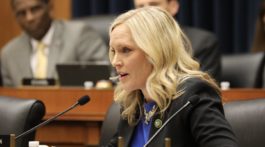by Abdul-Hakim Shabazz
I had an odd thought the other day. It came just a couple of days after Indiana Democrats and Republicans finished their state conventions and nominating their candidates for several statewide offices. Here it is. Part of Indiana’s election code might be unconstitutional when it comes to the independent, non-affiliated voter. Like I said, this was an odd, random thought so bear with me here.
At the basic level of Indiana, politics is the precinct committeeman (PC). That’s the person who is usually elected or can be appointed in some instances. They promote the party, work the polls on election day, help get volunteers, in other words, they do a lot of grunt work. Also, when a vacancy occurs in an elected public office, it’s usually the PCs in that area who pick the replacement, so it does have a perk or two.
Now like I said, there are two ways to get this job. A County Chairman or Chairwoman can appoint you. Or you can run for the position if there’s an opening. Now here’s where it gets interesting. When you run for PC, it’s in the primary, and it happens every four years; Republicans will elect their PCs in one cycle and Democrats in another. Democrats just got their turn back in May.
Now, not just anyone can run for PC. First, you have to reside in that precinct, which makes sense. But when you sign your paperwork, you have to not only promise you plan to vote for a majority of the members of the political banner you’re running under but if you’ve voted in another party’s primary or haven’t voted in a primary at all, you have to get “permission,” i.e., a letter from your County Chairman that you are a member of that party. And you also have to comply with party rules to be a candidate for that spot.
Here are the rules for the Democrats…
A Party member may only be a candidate for precinct committeeperson or state convention delegate if: (1) His or her most recent primary election in Indiana in which the candidate voted was in the Democratic party primary; or (2) The Democratic Party county chair of the county in which the person resides certifies that the person is a Democrat.
Here are the rules for the Republicans…
No person shall be eligible for election for the office of precinct committeeman or the appointment to the office of Precinct Committeeman or Vice-Precinct Committeeman unless the individual: (1) is a Qualified Elector of the precinct (if elected) or a Qualified Elector of the county (if appointed); and (2) is a Qualified Primary Republican; or (3) he/she obtains an authorization form signed by the County Chairman and the candidate for committeeman saying the individual pledges full support to the Republican Party and the candidates of the Republican Party.
So what’s wrong with this you might ask? Shouldn’t political parties have some say in who their members are? I tend to agree, but here’s where the problem comes in, it’s called the Indiana Constitution.
Under Section 9 of the Indiana Constitution (Freedom of Thought and Speech), it says, “ No law shall be passed, restraining the free interchange of thought and opinion, or restricting the right to speak, write, or print, freely, on any subject whatever: but for the abuse of that right, every person shall be responsible.” I read that to say the government can’t force you to think or speak a certain way without a pretty darn good reason, which I haven’t discovered yet.
And by compelling someone, who may have never voted in a primary or if they voted in the other political party’s primary to get permission from a Democrat or Republican County party chairman before they can run for an elected office seems pretty unconstitutional to me based on first glance.
It would be one thing if the two major political parties were acting on their own without government assistance, per se. Democrats and Republicans are perfectly within their rights to want members who agree and promise to support their candidates and principles. And they have a legitimate concern about someone trying to hijack their party process. However, when this is done, in part, with the weight, force, and blessing of the government, we run into some potential significant issues. And by using the government to compel an individual to think, write or speak in a specific manner, particularly to hold an elected office, I think we have run aground on some major constitutional issues.
And to be frank, I’m surprised no one has sued the State and the two major political parties over this, at least, not yet.
Abdul-Hakim is the editor and publisher of IndyPolitics.Org. He is also Of Counsel at the Indianapolis law firm of Lewis and Wilkins LLP. His opinions are his won, but you are free to adopt them.














